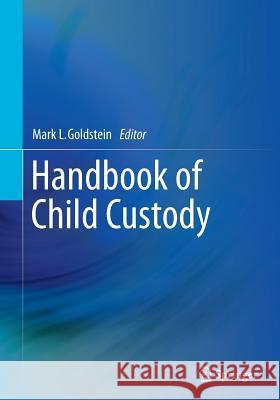Handbook of Child Custody » książka



Handbook of Child Custody
ISBN-13: 9783319345635 / Angielski / Miękka / 2016 / 353 str.
Handbook of Child Custody
ISBN-13: 9783319345635 / Angielski / Miękka / 2016 / 353 str.
(netto: 1262,21 VAT: 5%)
Najniższa cena z 30 dni: 1156,64
ok. 16-18 dni roboczych.
Darmowa dostawa!
Part I: Professional Issues.- Ethical Issues in Child Custody Evaluations.- Best Interest Factors in Child Custody Evaluations.- A Judicial Perspective on Child Custody Evaluations.- Part II: Interviewing/Observation.- Interviewing Parents Involved in Child Custody Evaluations.- Interviewing Children and Adolescents in Child Custody Cases.- Observing Parents Interact with Children: All Too Infrequently Asked Questions (and Answers).- Uses of Collateral Sources of Information in Forensic Child Custody Examinations.- Part III: Psychological Assessment.- Current and New Developments in Psychological Testing for Child Custody Disputes.- Projective Personality Assessment in Child Custody Evaluations.- Supplemental Parenting Inventories used in Custody Evaluations.- Empirically Assisted Assessment of Family Systems: The Bricklin Scales.- Alcohol/drug Abuse Issues in Child Custody Evaluations.- Assessment of Mental Disorders in Custody Evaluations.- How to Assess for Domestic Violence.- Evaluating Allegations of Child Sexual Abuse in Custody Disputes.- Part IV: Specialized Issues.- Child Custody Evaluations in Cases where Parental Alienation is Alleged.- Relocation Evaluations in Child Custody Disputes.- Impact of Conflicted Child Custody on School, Behavioral, and Social Outcomes: An Ecological Approach.- A Methodology Primer for Conducting Bonding Studies in Child Custody Evaluations: Integration with Neuroscience.- Cults, Extremist Movements and the Child Custody Evaluation: Pitfalls and Strategies.- Family therapy with Families in Intractable Conflicts about Child Custody and Visitation.- Part V: Case Studies and Psychological Reports.
Mark L. Goldstein is a licensed clinical psychologist in Illinois since 1976. Dr. Goldstein received his Ph.D. from the University of Florida in 1976 and has been director of a group practice since 1981, with offices in Buffalo Grove, Northbrook and Hinsdale, Illinois. In addition to his private practice in child custody, child abuse, and other forensic evaluations, he provides counseling services to children, adolescents and families. He is also a consultant to several suburban school systems. In addition, he has served as a professor and/or adjunct professor at several institutions including the University of Illinois College of Medicine, Roosevelt University, the Illinois School of Professional Psychology, the Forest Institute of Professional Psychology and the Chicago School of Professional Psychology.
Dr. Goldstein has conducted approximately 1200 custody evaluations and testified almost 100 times in Champaign, Cook, DuPage, Grundy, McHenry, Kane, Lake and Will counties, as well as in several other states. He is on the approved list of custody evaluators in a number of Chicago area counties. In addition, he served on the child custody committee of the Association of Family and Conciliation Courts, as well as the Psychology board of the American College of Forensic Examiners. He is also a diplomate of the Professional Academy of Custody Evaluators, and editorial board member of the American Journal of Forensic Psychology.
He has presented numerous workshops, papers and lectures at both national and international conferences, and has several publications on child custody, particularly in the areas of relocation and parental alienation. Furthermore, Dr. Goldstein is the co-author of Chronic Disorders in Children and Adolescents (Springer, 2011) and Aging and Chronic Disorders (Springer, 2007). He is also co-editor of the Handbook of Forensic Sociology and Psychology (Springer, 2013).
This authoritative reference brings together leading experts for up-to-date theory, findings, and guidelines on the core aspects of child custody evaluations. Contributors offer steps for gathering more accurate family data through home observations, interviews, and collateral information. Chapters examine psychological assessment tools commonly used in evaluations, including measures relating to parenting competencies, mental illness, domestic violence, and substance abuse, and consider increasingly salient issues such as relocation and families in therapy. The section on case studies shows best practices applied in real-life custody situations, and a chapter authored by a family court judge offers rarely-seen perspective from the bench.
Featured in the Handbook:
· A survey of ethical and professional issues.
· Observing and interviewing children, adolescents, and adults.
· Psychological assessment and personality testing.
· A detailed review of the Bricklin scales.
· Specialized issues, including parental alienation, attachment, cults, and more.
· Illustrative case studies and psychological reports.
Mental health professionals who conduct child custody evaluations, including psychiatrists, clinical psychologists clinical social workers, family and marriage counselors, and licensed clinical professional counselors, will appreciate the Handbook of Child Custody. Family law attorneys will also find the Handbook useful in assisting them in child custody litigation. Its thorough coverage will aid evaluators in making recommendations that are professional, ethical, and impartial, and family lawyers in understanding the evaluation process and preparing for expert testimony.
1997-2026 DolnySlask.com Agencja Internetowa
KrainaKsiazek.PL - Księgarnia Internetowa









